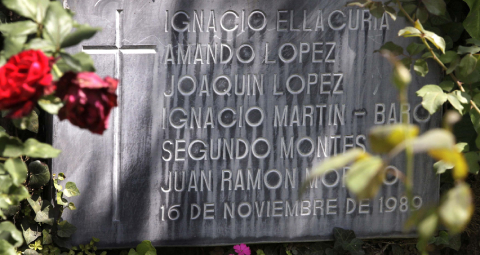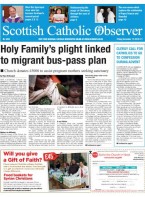December 6 | ![]() 0 COMMENTS
0 COMMENTS ![]() print
print

Blood of the martyrs, seed of hope
Mgr Peter Magee was a serving Vatican diplomat in El Salvador when, in 1989, six Jesuits, their housekeeper and her daughter were murdered. Thirty years on, he recalls the turmoil of the times, and his visit to the murder scene.
The Pope declared October 2019 an Extraordinary Mission Month, and invited us during that time to treasure and imitate the witness of those who have gone before us. He mentioned especially the martyrs, confessors of the Faith and missionary saints.
The martyr is persecuted and killed for the Faith; the confessor is persecuted but is not killed and the saint is the
missionary who has sustained the daily grind of fidelity to the truth and to virtue in the midst of life’s trials.
This focus on great missionaries prompted me to reflect on a very personal experience which dates back to 30 years ago on November 16.
My first mission as a papal diplomat was to El Salvador in Central America. It was 1988 when I arrived, aged 30. The country had been in the news for years because of a vicious civil war. By the time the war ended in the early 1990s, some 170,000 people had been killed out of a population of about six million.
Polarisation
El Salvador was deeply polarised along political lines (extreme right government and military versus extreme left, communist guerrilla forces) and along economic lines (a very rich minority and a very poor majority).
The polarisation had its roots in the nation’s history, but it was made worse by the Cold War. The Sandinista communist revolution had taken place in Nicaragua, another Central American country, in the late 1970s and early 80s. Because of this, and the presence of Cuba to the immediate south of the United States, and because of other political developments in the region, the American government pumped huge amounts of money into El Salvador. The aim was to ensure the communists would not take hold there. You could say it was a matter of national security for the US. At the same time, the Soviet Union was supporting its own associates in the region.
When I arrived in 1988, some halting steps towards a peace process had taken place, but both sides still seemed to have ‘fire in their belly’ to try and prevail and defeat the other. Living in the capital of San Salvador, signs of insecurity were all the more visible because of the omnipresence of the security forces. At night, you would hear bombs exploding, or exchanges of gunfire, usually in the distance. I remember especially the deep ‘thud’ I would feel in the building where I stayed when the guerrilla forces would bomb the power plants feeding electricity to the city. Blackouts were frequent, and the poorest suffered most from them.
Panic
We lived in the diplomatic area of the city; the government and army were quick to make sure the power was restored there as soon as possible!
While I don’t recall there being a night curfew, it was obvious that people lived in a permanent state of low-intensity panic since, relatively early in the evenings, very few were out and about. I recall once hearing confessions in a parish church on the edge of the diplomatic zone, San José de la Montaña, when a bomb exploded at a nearby bank. I could feel the heat of it come right into the confessional, positioned at the door of the church, with people running panic-stricken towards the sanctuary. Thankfully, no-one was hurt in the church. Outside, I don’t know.
Incidents like this were frequent, as were casualties. I used to meet with the young people in the parish in the early evening.
By 7pm they were always anxiously looking at their watches to get home. In other words, there was a climate of fear inside the cities and even more fear in the rural areas where the poorest were often the victims of the violence of both sides of the war.
In this messy situation, there were some who tried to speak out, to speak reason. Among them were the Jesuits who worked at the University of Central America in San Salvador.
Social justice
The rector was a Fr Ignacio Ellacuría, whom I am going to call Fr Ignatius. He had a typical Basque appearance, ascetic and somewhat severe. But he was a kind and warm man, at least to me personally; his warmth became passionate and even fiery when exposing and defending his ideas and the poor at whose service he was putting his considerable intelligence. At that time, the Jesuits throughout the whole world were placing an emphasis on social justice as an important contemporary expression of living out the Gospel.
Fr Ignatius was passionate about ending the polarisation in El Salvador and restoring the balance that comes from practical justice, such as equal opportunities for everyone in education and health, equality before the law, etc.
However, he was perceived by many in Salvadoran society, and even in the Church, as a supporter of the left-wing guerrilla forces simply because he tried to speak up for the poor and broker a rapprochement between the two sides in the war.
Violence
He tried to present the legitimacy of certain aspects of the left-wing ideology to the whole of Salvadoran society. He likewise condemned unequivocally the illegitimate use of violence by either side. His main passion was to educate.
Education, combined with working for peace, would be the centrepiece of any strategy to lift the poor out of injustice and misery and bring harmony to the whole of Salvadoran society.
I don’t think there is any doubt that the leftists used Fr Ignatius, without scruples, for their own ends. It suited them to sell their position as being supported by the prestigious Jesuits. For their part, the right-wing establishment and their media outlets poisoned the minds of ordinary Salvadorans with propaganda against Fr Ignatius, the Jesuits and their entire apostolate in the country. I remember well hearing wealthy Salvadorans at diplomatic receptions speak ignobly of these men, without reflecting, without informing themselves and without any temperance in their hateful speech. I felt more appalled by that than by anything the Jesuits were accused of doing.
On November 16, 1989, the leftist guerrillas (FMLN) launched a major attack on the capital city, San Salvador, advancing in from the north of the city, where the diplomatic community and the wealthy lived. The Salvadoran army was taken by surprise and incandescent because of it. It was also furious as the attack on the diplomatic area could have caused major problems internationally.
Conflict
Late on November 16 (I always remember it because it is the feast of St Margaret of Scotland), a rapid-reaction battalion of the Salvadoran army was dispatched to the University of Central America. Their mission was to kill Fr Ignatius whom, without any proof or even reasonable conjecture, they considered as the mastermind behind the latest military attack. The orders given were also that no witnesses should be left alive.
And so, Fr Ignatius, five other Jesuits, their housekeeper Julia Elba Ramos, 42, and her daughter Cecilia Ramos, 15, were shot in cold blood just outside their residence at the university. The soldiers used an AK-47, a Russian-made gun, among other weapons to give the impression that it was guerrillas who had done the deed.
Early on the morning of November 17, as we were finishing breakfast, the front doorbell rang and in came the Archbishop of San Salvador and the Provincial of the Jesuits. They were as white as sheets, trembling with both anger and fear. They could barely tell us what had happened (at this point, we in the Vatican Embassy did not yet know of the massacre, although at Mass earlier that morning, we had to take refuge behind the altar because bullets were coming in through the windows of our chapel). We went with them in the car to the university.
Holiness
It was an experience I will never forget. The sight of the carnage and the need to retch. There was something else, though. While I could feel the terror of the moment (I wondered if I myself might be shot, too, at some point in the ensuing days if a persecution of the Church was underway), I also felt something that I can only describe as holiness. Not holiness as a moral or spiritual state, but a holiness ‘out there’ in front of me, covering the slain and covering those of us there. If I can put it this way, it was an ‘objective’ holiness, something I touched as if touching the breeze or as if I were being touched by it.
On reflection, I think it fair to say that we were touched by God in that horrible, terrifying place and time, because those who had been slain had been slain for putting the Gospel into practice. They had quite simply imitated Christ the Lord to the end. I think it must have been how Mary and John and the others, felt at the foot of the Cross. A senseless, violent death, yet one which breathed forth the life-giving holiness of God. That ‘holiness out there’ remained present in the ensuing days. The funeral, with the six coffins side-by-side in the university chapel, intensified the experience. Only God could bring something so holy out of something so horrible.
That moment had a profound impact on me and my understanding of being a priest. Preaching the Gospel can never be about kowtowing to ideological or political perspectives, or any other perspectives for that matter. In El Salvador, I was often myself told I was left-wing because I used to say Mass for the poor on weekends. When in Cuba eight years later, I was considered a right-wing nutter because I did the same thing. As Dom Helder Camara once said: “When I feed the poor, I am a saint. When I ask why the poor have no food, I am a communist.”
Wisdom
As Jesus said, wisdom is proved by her children. The Gospel is proved by the fruits of holiness and truth that it gives, not by the applause or mockery from the narrow and filtering minds of those who only want you to say what they want to hear. Fr Ignatius was a missionary martyr, even if not as yet proclaimed as such by the Church. Pope Francis asks us to treasure and imitate such people.
I certainly treasure Fr Ignatius. Whether or not I am imitating him is for another day.
Missionary life is not something for somewhere else, for some other time, for some other people. It’s not a series of concepts and precepts. It’s about the true meaning of life itself and, for some, of death itself. The challenge is for you and for me. Am I prepared to stand up for Christ no matter how mocked or praised I am? Am I myself among those who filter the message of the truth to suit my own preferences? If San Salvador can be the holy ground of mission for Christ, why cannot the place where I, or you, live? And who are these missionaries to be? If not you, then who? If not here, then where? If not now, then when?
—Mgr Peter Magee, a former Vatican diplomat, is parish priest of St Mary Star of the Sea, Largs and Our Lady of Perpetual Succour, Millport. This article is adapted from a homily, which was published on ThinkingFaith website.










